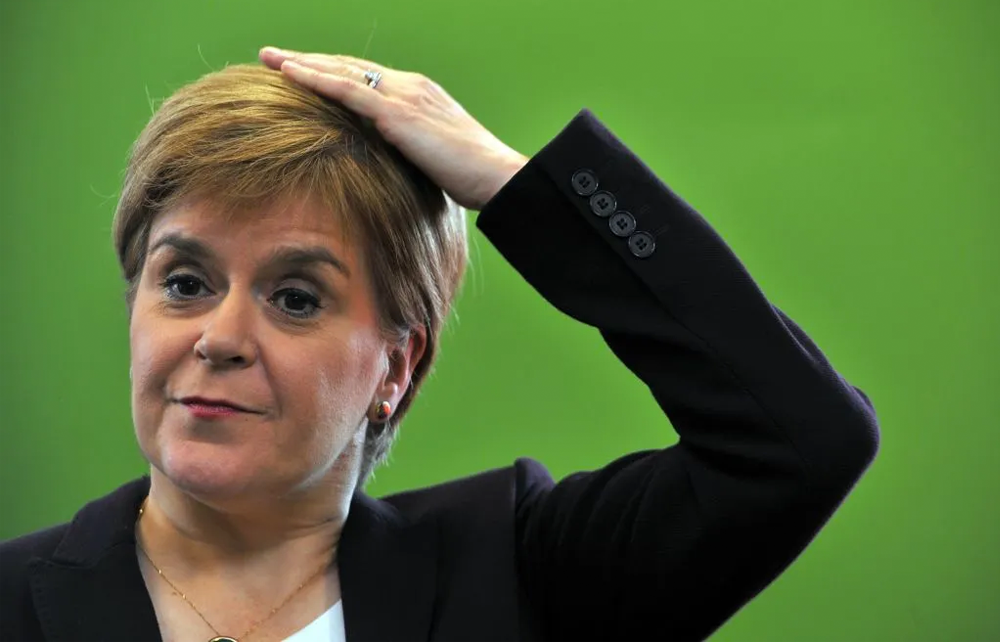Nothing in life or politics lasts forever, not even Nicola Sturgeon’s legendary popularity. In a recent poll, 42 percent of Scots said the first minister should step down immediately. It seems she has taken the hint: this morning Sturgeon announced that she would be resigning after eight years as head of the Scottish government.
“The nature and form of modern political discourse means there is a much greater intensity — dare I say it brutality — to life as a politician than in years gone by,” she said in a press conference at Bute House in Edinburgh.
As Sturgeon prepares to hand over to her successor, there is no doubt that the Scottish National Party still dominates Scottish politics. But every dog in the street, as they say here, knew that Sturgeon’s time was coming to an end.
Sturgeon’s policy of gender self-declaration is, of course, the proximate cause of the first minister’s misfortune. The incarceration of a double rapist, Isla Bryson, in a women’s prison, has turned into a moral and political Chernobyl. The more Sturgeon tries to tamp it down, the worse the fallout. Every press conference was being dominated by the question: is Bryson a man or a woman?
Sturgeon still refuses to say — even though she ordered the Scottish Prison Service to send “the individual,” as she describes him, to a male jail. The reason is that affirming his biological sex might undermine her Gender Recognition Reform Bill. This legislation would give Adam Graham — to use Bryson’s “deadname” — a legally-enforceable gender recognition certificate on demand, making him legally a woman.
The Bill has been blocked by the UK government on the grounds that this would potentially damage women’s rights under the UK Equality Act. Scots appear to agree: they oppose the GRR Bill by two to one.
Revelations this week of what happened at the Tavistock gender clinic added to the pressure on Sturgeon. Scotland’s gender clinic, the Sandyford in Glasgow, has been following a comparable “affirmative” policy when it comes to puberty blockers. It has reportedly been giving similar drugs to nine-year-olds to pause the development of their male or female bodies.
But gender isn’t the only front on which this hitherto immensely successful politician was fighting. She has fallen out with Scotland’s largest council, Glasgow, after a leaked report said it was considering axing 800 teachers. The first minister ordered the normally hyper-loyal SNP leader, Susan Aitken, to reverse-ferret and hire more teachers, even though the council will get no extra cash to pay for them. Education secretary Shirley-Anne Somerville then threatened to penalize the council financially if it fails to comply. The SNP-dominated Confederation of Scottish Local Authorities is up in arms against Sturgeon over Glasgow and what it claims is a decade of funding cuts.
Councils are trying to cope with runaway inflation and increased labour costs following recent industrial action. Rolling strikes by teachers across Scotland are damaging children’s education and worsening the attainment gap. COSLA (the Convention of Scottish Local Authorities) and public sector unions are also trying to scupper the SNP’s flagship £800 million ($962 million) Social Care Service, intended to ease bed-blocking in National Health Service hospitals.
Thousands are waiting over two years for inpatient treatment. The chairman of the Scottish BMA (British Medical Association), Dr. Iain Kennedy, says the NHS in Scotland is “broken” and cannot survive as an “all-you-can-eat buffet service.” Health is already becoming semi-privatized in Scotland. Since the pandemic there has been a 68 percent increase in people going private to escape eternal waiting lists. NHS dentists are as rare as hen’s teeth.
Yet Scotland spends 27 percent more per head on public services than England, according to the Institute for Fiscal Studies. Until now, Nicola Sturgeon has got away with blaming “Westminster Tory austerity.” But Scots are beginning to realize that austerity begins at home. Mismanagement of the Scottish economy, and the underperforming tax base, cannot be blamed on Westminster. Nor can endless unforced errors, mostly involving the SNP’s coalition partners, the Scottish Greens.
An attempt to rush through a deposit return scheme for single-use containers has been widely labeled a “disaster” even before it has begun. As with the attempt to ban petrol and diesel cars, this is a worthy objective undermined by poor execution. The Scottish government has already had to push back its 2030 target date for the ban on fossil-fuel vehicles. The proposal to outlaw gas central heating boilers in new-build homes as early as 2025 looks likely to go the same way.
The list of failing initiatives goes on and on. Scotland’s whisky industry, worth £4 billion ($4.8 billion) a year, is desperately fighting restrictions on alcohol advertising. Botched ferry contracts are expected to cost the taxpayer £500 million ($600 million). Perhaps worst of all, Sturgeon’s promise to turn the 2024 general election into a “de facto” referendum on independence has proved hugely unpopular. It has opened a new split in the SNP, with MPs and MSPs openly attacking a policy they believe could seriously undermine the independence cause. A poll by Lord Ashcroft for Holyrood magazine suggests only 21 percent of Scots agree that “the next general election should be taken as a de facto independence referendum.” In the same poll, “No” now leads “Yes” by 12 percent on the question of independence: the widest margin in years.
As if all that wasn’t enough, Police Scotland are probing a potential misuse of party funds involving Sturgeon’s husband, the SNP chief executive Peter Murrell. This marital duopoly has exerted such tight party control over the years that no serious rival has been allowed to emerge should Sturgeon fall under the proverbial bus. The front runner, if she can be called that, is the finance secretary, Kate Forbes: a thirty-two-year-old religious conservative whose church opposes same-sex marriage. But Forbes is a relative unknown: she was identified by only 7 percent in the recent Panelbase poll, two points ahead of the former Westminster leader Angus Robertson. A grand total of 69 percent of those surveyed couldn’t think of any politician to replace the SNP leader.
But now, they have to.
This article was originally published on The Spectator’s UK website.

























